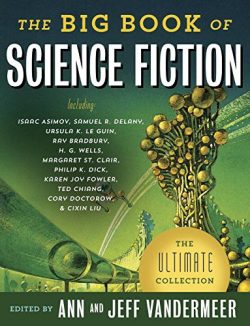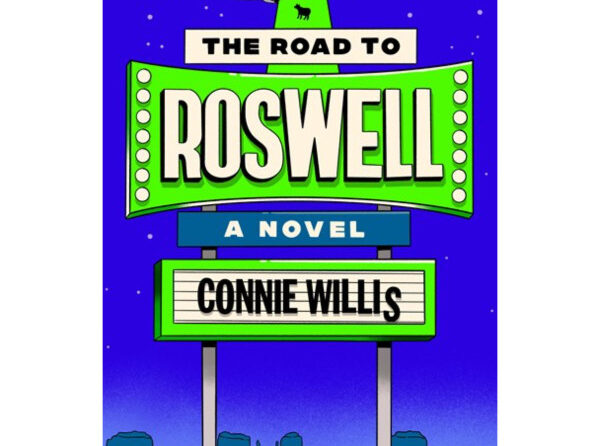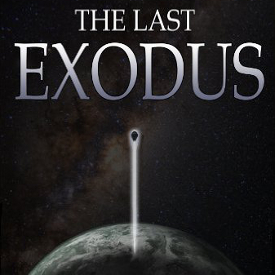
- Paperback: 1216 pages
- Publisher: Vintage (July 12, 2016)
- Language: English
- Paperback: $15.86
- Kindle: $12.99
- Product Dimensions: 6.9 x 2 x 9 inches
- Shipping Weight: 3.8 pounds
The Best of Science Fiction, edited by Groff Conklin and published in 1946, was a tour de force.
It firmly established the short story SF anthology as a viable outlet for the genre and, through its selections, provided an outline of the genre’s boundaries, if not a working definition by way of example.
Conklin’s book would prove the market for such endeavors, and it would not be too many more years before a host of annual collections would help readers stay abreast of the field.
 Conklin had been preceded by Wollheim’s Pocket Book of Science Fiction. He would be joined by Healy And McComas Adventures in Time and Space, Campbell’s Astounding Tales of Space and Time, Ditky’s Annual Best, Wollheim and Carr’s annual best and Judith Merrill’s Annual Best of series.
Conklin had been preceded by Wollheim’s Pocket Book of Science Fiction. He would be joined by Healy And McComas Adventures in Time and Space, Campbell’s Astounding Tales of Space and Time, Ditky’s Annual Best, Wollheim and Carr’s annual best and Judith Merrill’s Annual Best of series.
Just released this past week, those and other seminal anthology series, both young and old, are joined by Ann and Jeff Vandermeer’s massive undertaking, The Big Book of Science Fiction, which shares a title with another Conklin anthology.
Having read their introduction and surveyed the contents (this tome, and tome it is, comes in at just about 1,200 pages) I can already state that about the only reasonable criticism one can hold is that the title lacks in originality.
Considering the vast arrary of works the Vandermeers had to survey, essentially encompassing the entirety of the field from its proto beginnings with Shelley, Verne and Wells, one can perhaps forgive the lack of attention given to the title.
On the other hand, Conklin’s original effort seems to have faded into the mists of time, an artifact only remembered by historians and collectors in the field.
Nevertheless, as an historian and collector in the field, one particularly enamored of anthologies, I find the title bothersome. This new volume ought to have been titled The NEW Big Book of Science Fiction, at the very least, if not sporting a more apt and definitive title, such as The Massive and Comprehensive Book of the History of the Genre of Science Fiction That is Only Incomplete Because Authors Are Still Writing in the Field.
One suspects that such a title would be off-putting to sellers and buyers alike and that sometime during the design process a title such as The Only SF Anthology You Will Ever Need or The Book of Science Fiction for People Stranded on Desert Islands would have been suggested as having slightly more shelf appeal.
A more direct and immediate appeal might have taken the form of THIS Is Science Fiction. A more comedic approach might be something like The Only SF Anthology Guaranteed to Kill with One Blow (and sufficiently lengthy to see you through serving a life sentence….)
As an aside, I’ll mention that TBBOSF in physical form (the only proper form for real book lovers) is a fine substitute for a home gymnasium, and a lot less expensive.
I’ll probably always think of this anthology as the Other The Big Book of Science Fiction, but that won’t be necessary for most readers as few these days have seen Conklin’s contribution.
It’s obvious from the contents and the introduction that the Vandermeers wanted to provide a one-stop-shop source that would allow a reader new to the field a more than sufficient foundation for further investigation of the genre: the primary literary themes both historical and contemporary are well represented; the introduction makes a strong appeal for the opening of the field to non-insiders, as well as a strong appeal to “world SF”; the introduction surveys the history of the field in fairly large brushstrokes; the editors are completely up-front about their process and their limitations.
The Big Book of Science Fiction is destined to become one of those must-have collections and it will undoubtedly influence the nature of the science fiction anthology for many years to come, much as its namesake did during the “golden age” of the field.
The Vandermeer’s introduction touches upon the pulp era, the golden age, horror’s influence, the new wave, cyber and steampunk, afrofuturism, the feminist wave and world SF. The Vandermeer’s takes on these subjects do not entirely jive with my own and our different views are worth examining. However, such an examination deserves a well-considered and thoughtful approach (three years working on a single anthology is deserving of a lot of consideration), which I am unable to devote at the moment (but will at a future date).
It’s sufficient at this time, I think, to state that The Big Book of Science Fiction is well worth its price, and well worth the many, many hours it will take to work through its selections.
Conklin’s seminal effort, The Best of Science Fiction, was meant to serve much the same function as The Big Book – a survey of the field that encompasses both history and theme. Some 7 decades have elapsed since The Best was published. I think a comparison of the contents of both is instructive. Herewith, the tables of contents from both volumes:
[two]The Best of Science Fiction, ed. Groff Conklin. Crown Publishers, 1946
Concerning Science Fiction John W. Campbell, Jr.
Introduction Groff Conklin
Part One The Atom
Solution Unsatisfactory Anson MacDonald
The Great War Syndicate Frank R. Stockton
The Piper’s Son Lewis Padgett
Deadline Cleve Cartmill
Lobby Clifford D. Simak
Blowups Happen Robert Heinlein
Atomic Power Don A. Stuart
Part Two The Wonders of Earth
Killdozer! Theodore Sturgeon
Davey Jones’ Ambassador Raymond Z. Gallun
Giant in the Earth Morrison Colladay
Goldfish Bowl Anson MacDonald
The Ivy War David H. Keller
Liquid Life Ralph Milne Farley
Part Three The Superscience of Man
A Tale of the Ragged Mountains Edgar Allan Poe
The Great Keinplatz Experiment Arthur Conan Doyle
The Remarkable Case of Davidson’s Eyes H. G. Wells
The Tissue-Culture King Julian Huxley
The Ultimate Catalyst John Taine
The Terrible Sense Calvin Peregoy
A Scientist Divides Donald Wandrei
Part Four Dangerous Inventions
Tricky Tonnage Malcolm Jameson
The Lanson Screen Arthur Leo Zagat
The Ultimate Metal Nat Schachner
The Machine Don A. Stuart
Part Five Adventures in Dimension
Short-Circuited Probability Norman L. Knight
The Search A. E. van Vogt
The Upper Level Road F. Orlin Tremaine
The 32nd of May Paul Ernst
The Monster from Nowhere Nelson Bond
Part Six From Outer Space
First Contact Murray Leinster
Universe Robert Heinlein
Blind Alley Isaac Asimov
En Route to Pluto Wallace West
The Retreat to Mars Cecil B. White
The Man Who Saved the Earth Austin Hall
Spawn of the Stars Charles W. Diffin
The Flame Midget Frank Belknap Long, Jr.
Expedition Anthony Boucher
The Conquest of Gola Leslie F. Stone
Jackdaw Ross Rocklynne
[/two] [two_last]The Big Book of Science Fiction. ed. A & J Vandermeer, Vintage, 2016
The Star – H. G. Wells
Sultana’s Dream – Rokheya Shekhawat Hossein
The New Overworld – Paul Scheerbart
The Triumph of Mechanics – Karl Hans Strobl
Elements of Pataphysics – Alfred Jarry
Mechanopolis – Miguel de Unamuno
The Doom of Principal City – Yefim Zozulya
The Comet – W. E. B. Du Bois
The Fate of the Poseidonia – Clare Winger Harris
The Star Stealers – Edmond Hamilton
The Conquest of Gola – Leslie F. Stone
A Martian Odyssey – Stanley G. Weinbaum
The Last Poet and the Robots – A. Merritt
The Microscopic Giants – Paul Ernst
Tlön, Uqbar, Orbis Tertius – Jorge Luis Borges
Desertion – Clifford D. Simak
September 2005: The Martian – Ray Bradbury
Baby HP – Juan José Arreola
Surface Tension – James Blish
Beyond Lies the Wub – Philip K. Dick
The Snowball Effect – Katherine MacLean
Prott – Margaret St. Clair
The Liberation of Earth – William Tenn
Let Me Live in a House – Chad Oliver
The Star – Arthur C. Clarke
Grandpa – James H. Schmitz
The Game of Rat and Dragon – Cordwainer Smith
The Last Question – Isaac Asimov
Stranger Station – Damon Knight
Sector General – James White
The Visitors – Arkady and Boris Strugatsky
Pelt – Carol Emshwiller
The Monster – Gérard Klein
The Man Who Lost the Sea – Theodore Sturgeon
The Waves – Silvina Ocampo
Plenitude – Will Worthington
The Voices of Time – J. G. Ballard
The Astronaut – Valentina Zhuravlyova
The Squid Chooses Its Own Ink – Adolfo Bioy Casares
2 B R 0 2 B – Kurt Vonnegut Jr.
A Modest Genius – Vadim Shefner
Day of Wrath – Sever Gansovsky
The Hands – John Baxter
Darkness – André Carneiro
“Repent, Harlequin!” Said the Ticktockman – Harlan Ellison
Nine Hundred Grandmothers – R. A. Lafferty
Day Million – Frederik Pohl
Student Body – F. L. Wallace
Aye, and Gomorrah – Samuel R. Delany
The Hall of Machines – Langdon Jones
Soft Clocks – Yoshio Aramaki
Three from Moderan – David R. Bunch
Let Us Save the Universe – Stanisław Lem
Vaster Than Empires and More Slow – Ursula K. Le Guin
Good News from the Vatican – Robert Silverberg
When It Changed – Joanna Russ
And I Awoke and Found Me Here on the Cold Hill’s Side – James Tiptree Jr.
Where Two Paths Cross – Dmitri Bilenkin
Standing Woman – Yasutaka Tsutsui
The IWM 1000 – Alicia Yánez Cossío
The House of Compassionate Sharers – Michael Bishop
Sporting with the Chid – Barrington J. Bayley
Sandkings – George R. R. Martin
Wives – Lisa Tuttle
The Snake That Read Chomsky – Josephine Saxton
Reiko’s Universe Box – Kajio Shinji
Swarm – Bruce Sterling
Mondocane – Jacques Barbéri
Blood Music – Greg Bear
Bloodchild – Octavia E. Butler
Variation on a Man – Pat Cadigan
Passing as a Flower in the City of the Dead – S. N. Dyer
New Rose Hotel – William Gibson
Pots – C. J. Cherryh
Snow – John Crowley
The Lake Was Full of Artificial Things – Karen Joy Fowler
The Unmistakable Smell of Wood Violets – Angélica Gorodischer
The Owl of Bear Island – Jon Bing
Readers of the Lost Art – Élisabeth Vonarburg
A Gift from the Culture – Iain M. Banks
Paranamanco – Jean-Claude Dunyach
Crying in the Rain – Tanith Lee
The Frozen Cardinal – Michael Moorcock
Rachel in Love – Pat Murphy
Sharing Air – Manjula Padmanabhan
Schwarzschild Radius – Connie Willis
All the Hues of Hell – Gene Wolfe
Vacuum States – Geoffrey A. Landis
Two Small Birds – Han Song
Burning Sky – Rachel Pollack
Before I Wake – Kim Stanley Robinson
Death Is Static Death Is Movement – Misha Nogha
The Brains of Rats – Michael Blumlein
Gorgonoids – Leena Krohn
Vacancy for the Post of Jesus Christ – Kojo Laing
The Universe of Things – Gwyneth Jones
The Remoras – Robert Reed
The Ghost Standard – William Tenn
Remnants of the Virago Crypto-System – Geoffrey Maloney
How Alex Became a Machine – Stepan Chapman
The Poetry Cloud – Cixin Liu
Story of Your Life – Ted Chiang
Craphound – Cory Doctorow
The Slynx – Tatyana Tolstaya
Baby Doll – Johanna Sinisalo[/two_last]
A list of the authors shared in common is not really fair, considering the 70 year span between the two anthologies, but it is interesting, if only because of how few there are:
H.G. Wells
Leslie F. Stone
Clifford Simak
Ted Sturgeon
Isaac Asimov











1 Comment